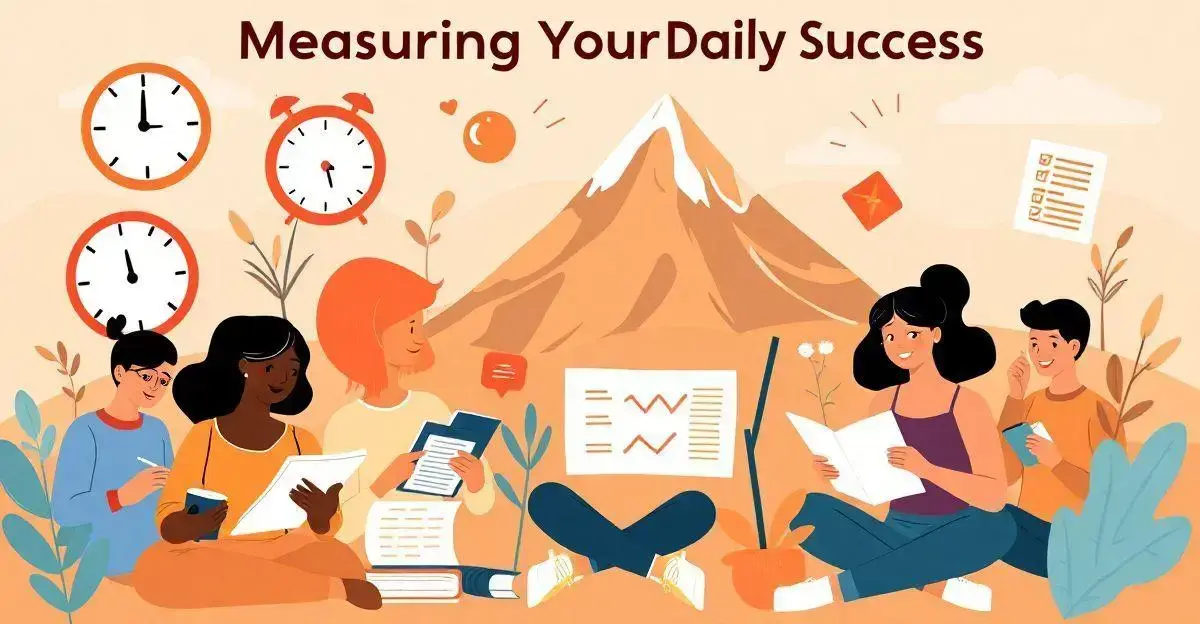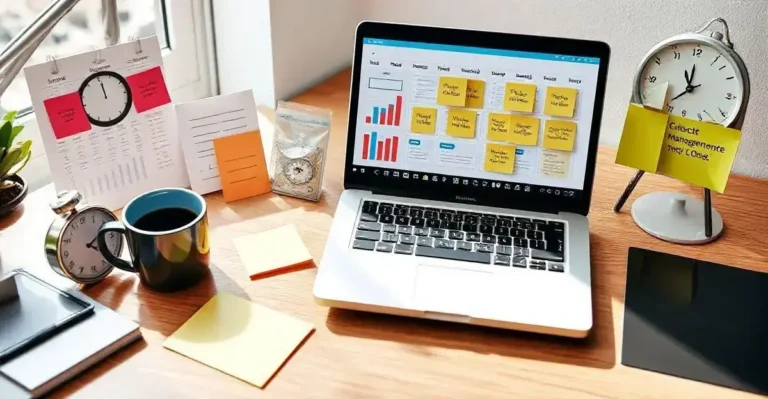Boost daily efficiency is key for anyone aiming to transform productivity and simplify their daily routines. With a few strategic adjustments, it’s possible to streamline your tasks, allowing you to accomplish more without the stress of rushing through each day.
In a world that demands constant multitasking, learning how to boost efficiency can mean the difference between feeling overwhelmed and staying ahead. By discovering tools and strategies that align with your goals, you’re setting the stage for consistent growth and success.
Ready to explore practical ways to work smarter and unlock your full potential? Let’s dive into the best tips to make every day a productive one.
Understanding Daily Efficiency
Understanding daily efficiency is crucial for anyone striving to boost daily efficiency and make the most out of each day. It involves recognizing how you spend your time and identifying areas for improvement.
Daily efficiency can be significantly enhanced by prioritizing tasks and focusing on what truly matters. By breaking down larger tasks into smaller, manageable steps, individuals can feel a sense of achievement and maintain momentum throughout the day.
One key approach is to evaluate your weekly schedule. Reviewing accomplishments at the end of each week can help you understand your productivity patterns. Additionally, utilizing tools like calendars or task management apps can assist in keeping track of responsibilities and deadlines, helping you boost daily efficiency over time.
Moreover, establishing a routine that incorporates breaks allows your mind to recharge, which ultimately leads to better focus and productivity. Remember, quality over quantity should be a guiding principle in assessing your daily accomplishments.
Importance of Time Management

Importance of Time Management cannot be overstated in achieving Boost Daily Efficiency. When individuals manage their time well, they can minimize stress and work with focus.
Time management means organizing and planning how to divide your time between various activities.
Using techniques like the Pomodoro Technique helps individuals stay focused during work sessions while allowing short breaks in between. This method boosts productivity and keeps energy levels high.
Prioritizing tasks is also essential. By using tools like the Eisenhower Box, one can easily categorize tasks by urgency and importance. Furthermore, setting deadlines can improve accountability. When you set a time limit for each task, you are more likely to complete it efficiently.
Also, be sure to review your goals regularly. This will allow you to adjust your time management strategies to meet your evolving needs.
Tools to Boost Your Efficiency
Using the right tools is essential to boost daily efficiency and get the most out of your day. One popular tool is task management software, which helps you organize your tasks and deadlines. This can include apps like Trello or Asana that allow you to prioritize your work visually.
Another effective tool is a time-tracking application. These apps, such as Toggl or RescueTime, help you understand how you’re spending your time. By recognizing time-wasting activities, you can adjust your habits to become more productive.
Additionally, using a calendar tool can greatly enhance your scheduling. Tools like Google Calendar or Outlook help you keep track of meetings and important deadlines, ensuring you never miss an important task.
Moreover, consider using an automation tool, such as Zapier, which connects different apps to automate repetitive tasks. This saves you time and allows you to focus on more critical projects, further helping you boost daily efficiency.
Finally, note-taking applications, like Evernote or OneNote, can help capture ideas and important information quickly. Staying organized with notes ensures you have all the resources needed at your fingertips.
Setting Realistic Goals

Setting realistic goals is a key aspect to boost daily efficiency. When you set achievable goals, you are more likely to stay motivated and maintain focus.SMART goals is a popular method that helps in setting effective goals.
SMART stands for Specific, Measurable, Achievable, Relevant, and Time-bound.
To begin, ensure your goals are specific. Instead of saying, ‘I want to be fit,’ a specific goal would be, ‘I want to run a 5K race.’
Next, make sure your goals are measurable. This means you should be able to track your progress. For example, running a distance of 3 miles in under 30 minutes provides a clear measure of success.
Your goals also need to be achievable. This means setting goals that are challenging yet attainable based on your current resources and skills. It is important to remain realistic while pushing your limits.
Additionally, ensure your goals are relevant. Make sure they align with your overall objectives and are meaningful to you. Finally, setting a time frame makes your goals time-bound.
For instance, say, ‘I will complete my 5K within three months.’ This creates urgency and helps you stay on track.
By following the SMART framework, you can create a strong foundation for achieving your goals, which ultimately leads to better daily efficiency.
Eliminating Time Wasters
Eliminating time wasters is a fundamental step to boost daily efficiency. To start, identify the activities that consume your time without adding value. Common time wasters include excessive social media use, frequent email checks, and unnecessary meetings.
One effective strategy is to limit distractions. For instance, consider setting specific times to check your email rather than responding instantly. This allows you to focus on important tasks without constant interruptions. Additionally, using apps that block distracting websites during work hours can help you stay on track.
Another way to eliminate time wasters is by prioritizing tasks. Using the 2-Minute Rule can be helpful. If a task takes less than two minutes to complete, do it immediately instead of postponing it. This helps prevent small tasks from accumulating.
Furthermore, be mindful of meetings. Ask yourself if the meeting is necessary or if the information can be shared via email. When meetings are unavoidable, make sure they have clear agendas and time limits to keep them efficient.
Lastly, learn to say no to tasks that do not align with your priorities. Understanding your limits allows you to focus on what truly matters, maximizing your productivity.
Creating a Productive Workspace

Creating a productive workspace is essential to boost daily efficiency. A well-organized space can lead to improved focus and better results. Start by ensuring your desk is tidy and free from clutter. Remove any items that do not serve a purpose in your daily tasks.
Lighting plays a crucial role in productivity. Make sure you have sufficient natural light or invest in good-quality lamps. Proper lighting can reduce eye strain and keep you alert throughout the day.
Next, consider your ergonomics. Your chair and desk should be comfortable and supportive. Adjust your chair’s height so your feet can rest flat on the floor, and your monitor should be at eye level to prevent neck strain.
Incorporating greenery, like plants, can also enhance your workspace and help boost daily efficiency by creating a calm environment. Plants improve air quality and help reduce stress levels, which can positively impact your focus.
Additionally, keep essential tools and materials within arm’s reach. This reduces unnecessary movement and allows you to focus on tasks without interruptions. Use organizers or drawer dividers to keep everything in place.
Finally, personalize your space. A few inspiring quotes or images can uplift your spirits and create a positive atmosphere. When your workspace reflects your style, you are more likely to feel comfortable and motivated to work.
Maintaining Work-Life Balance
Maintaining work-life balance is essential for boosting daily efficiency and overall well-being. It involves finding the right harmony between professional responsibilities and personal life. One effective strategy is to set clear boundaries between work and home life. This means defining working hours and sticking to them to prevent work from spilling into personal time.
Another important aspect is to prioritize self-care. Taking time for yourself, whether through exercise, hobbies, or relaxation, helps recharge your energy and prevent burnout. Schedule regular breaks during work hours to maintain focus and productivity, which can significantly boost daily efficiency.
Additionally, utilizing tools for time management can greatly assist in balancing tasks. Apps that help in planning your day or week can ensure you allocate time for both work and leisure. Setting realistic goals will help prevent overwhelm and keep you focused on priorities.
Furthermore, effective communication with family and colleagues about your availability can foster understanding and support. This helps to reduce conflict and maintain strong relationships.
Lastly, remember that “it’s okay to say no”. Taking on too many commitments can lead to imbalance. By being selective about what you choose to engage in, you can maintain a healthier work-life balance and increase your productivity in both areas.
Measuring Your Daily Success

Measuring your daily success is crucial for boosting daily efficiency. It involves evaluating your achievements and identifying areas for improvement. Start by keeping a daily log of your tasks and accomplishments. Writing down what you achieve helps you see progress and keeps you motivated.
At the end of each day, review your log. Ask yourself which tasks were productive and which ones may have been time-wasters. This reflection helps you adjust your strategies for the next day and boost daily efficiency. Setting aside 10-15 minutes for this review can pay off significantly.
Another method is to set weekly goals. By establishing short-term targets, you can gauge your progress more effectively. For example, decide that you want to complete three major tasks by the end of the week and track your completion rate.
Consider using a scoring system for your achievements. Giving yourself points for completing tasks can gamify productivity and make it more enjoyable. At the week’s end, add up your points to see how well you performed.
Lastly, celebrate your achievements, no matter how small. Recognizing your hard work can encourage a positive mindset and increase your motivation to succeed further.
Conclusion About Boost Daily Efficiency
In summary, boost daily efficiency involves a combination of effective strategies, including time management, focus on priority tasks, and creating a conducive work environment.
By implementing tools to manage your workload and adopting practices that promote a healthy work-life balance, you can maximize productivity. Regularly measuring your daily success helps you track progress and adjust goals to stay motivated, which can significantly boost daily efficiency.
Remember, efficiency is not just about doing more; it is about doing the right things effectively. As you integrate these methods into your routine, you will likely see improvements in both your personal and professional life.
Stay committed to refining your approaches and you will enjoy the benefits of enhanced efficiency.

